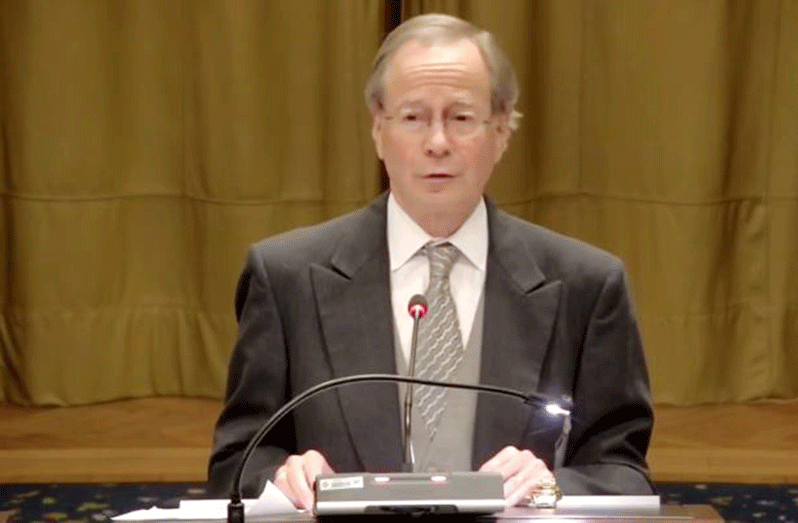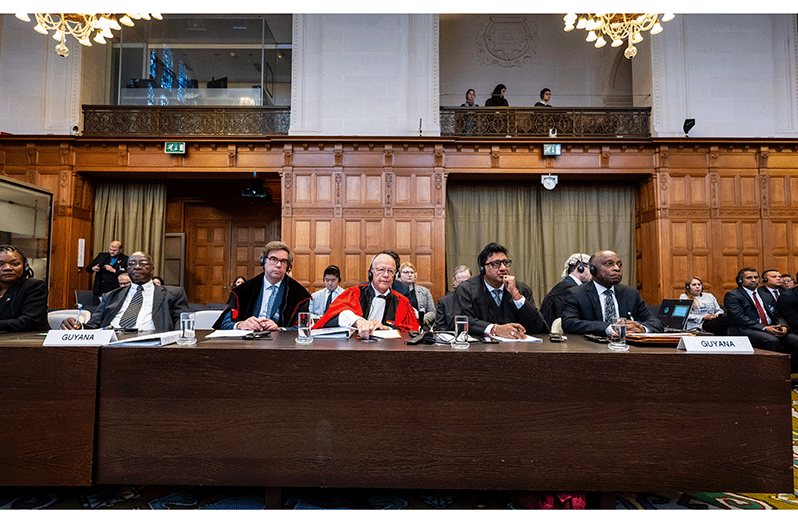World Court hears in passionate plea for urgent granting of provisional measures
GUYANA’S representatives, on Tuesday, urgently appealed for provisional measures to address the “imminent threat” occasioned by Venezuela’s upcoming referendum and called for the International Court of Justice (ICJ) to act now to prevent “incalculable and irreparable injury” to Guyana’s rights.
Renowned international legal counsel Paul Reichler, during his submissions at the Peace Palace in The Hague, Netherlands, explained that the referendum, as outlined by President Nicolas Maduro, aims to solidify Venezuela’s rejection of the 1899 Arbitral Award.
Additionally, it also challenges the ICJ’s jurisdiction in a move that could have profound consequences on the ongoing territorial controversy between the two nations.
As such, Reichler stressed the urgency of seeking the court’s assistance to prevent “incalculable and irreparable injury” to Guyana’s rights, particularly concerning the Essequibo region.
The territory, awarded to British Guiana in the 1899 Arbitral Award, is now at the centre of a revived territorial claim by Venezuela.
According to Reichler, the impending referendum is not merely a gauge of public opinion but a strategic move by Spanish-speaking nation to gain popular support for decisions that have already been made at the highest levels of its government.
“Venezuela has made clear that the purpose of this referendum is not merely to assess public opinion. It is to obtain popular support for decisions that the government has already made and a licence to act on those decisions,” he said.

Reichler pointed to the deliberate crafting of referendum questions, designed to leave no outcome other than an overwhelming mandate for the Venezuelan government’s predetermined actions.
The questions, as analysed by Reichler, not only reject the Arbitral Award but also challenge the ICJ’s jurisdiction, paving the way for the annexation of Guyana’s territory and its incorporation into Venezuela as a new state.
“These questions have been deliberately crafted, so as to leave no possible outcome other than an overwhelming mandate for the government to take actions that it has already decided upon,” Reichler said.
The legal counsel raised concerns about the impact of the referendum on Guyana’s rights, particularly in the event of the rejection of the 1899 Arbitral Award and the court’s jurisdiction.
Reichler further questioned the viability of the ICJ’s role after a popular mandate to reject the award, leaving Guyana’s rights in jeopardy.
“Will there be any role left for you to decide upon the validity of the award? After the referendum produces an overwhelming popular mandate to reject it, and the boundary is fraudulently imposed so that Venezuela can take back the territory that was stripped from it,” he said.
Reichler also highlighted Venezuela’s intentions to reject the court itself, as indicated by President Maduro’s explicit statement that Venezuela “will never recognise the International Court of Justice as an instance for the attention or resolution of this matter.”
“How can the President of Venezuela declare a month before the referendum is held that the outcome will be a rejection of the court as a means for the resolution of the territorial controversy with Guyana?” Reichler later questioned.

URGENT ACTION
Drawing attention to Venezuela’s military preparations, including the construction of a military airfield near the international boundary, Reichler underscored the urgency of the situation.
He warned that the impending annexation of Guyana’s territory by Venezuela, coupled with its rejection of the court’s jurisdiction, could result in irreparable damage to Guyana’s rights.
“As the court has explained on various occasions, the condition of urgency is met when the acts susceptible of causing irreparable prejudice can occur at any moment before the court makes a final decision on the case,” he said.
Reichler concluded by asserting that Guyana has taken no actions that would disrespect the court or prejudice Venezuela’s claims.
He called for the court to consider provisional measures urgently to prevent irreversible harm to Guyana’s rights until a final judgement on the merits is reached.
“In contrast to Venezuela, Guyana has taken no action nor does it intend to take any action that would disrespect the court or prejudice the rights claimed by Venezuela to the territory at issue in this case. There is nothing that Guyana or British Guiana has done before in the 124 years, it has been administering the territory following the 1899 Arbitral Award that would prevent it from ceding the territory to Venezuela if the court were to set aside the award and establish a new boundary along the line that Venezuela now claim…”
“… nor is there a scintilla of evidence that Guyana would adopt measures irreparably prejudicial to vent this claim during [this] time until the court issues its final judgement on the merits. The evidence is all to the contrary. It establishes that only one party to these proceedings is acting to the irreparable prejudice of the other’s rights and that the transgressive party is Venezuela,” he said.
Meanwhile, Professor Emeritus Alain Pellet, former Chairman of the International Law Commission, echoed concerns expressed by Reichler over Venezuela’s attempts to evade the court’s jurisdiction.
POTENTIAL CONSEQUENCES
The urgency of the matter was also underscored as Pellet delved into the potential ramifications of Venezuela’s impending referendum.
“One can hardly ignore the idea that Venezuela is attempting, by all means, to evade the court’s jurisdiction. If not too intimidated, as if ladies and gentlemen members of the court, you could be intimidated,” he said.
Reichler had painted a stark picture of the immediate threat, emphasising that Venezuela’s actions were far from mere rhetoric.
The prospect of military action loomed large, especially given the expected affirmative response to the questions posed in the December 3 referendum.
“He (Reichler) has amply demonstrated that the threat is immediate. This is not a paper tiger. And given the almost certain affirmative answer to the questions posed in the referendum, Venezuela was effectively preparing to engage in military action,” Pellet said.
He explained that Guyana’s request is designed to prevent Venezuela from relying on supposed popular support to legitimise actions that have been indoctrinated for generations.
This request aims to counter the creation of a fait accompli (an accomplished fact), a strategy initiated by Venezuela’s resolution on October 20.
“This is what we were asking of you… that by affirming this request, you will ensure that your future judgement can be enforced regardless of the position that you will take,” he said.
The request, Pellet explained, is forward-looking, intended to prevent further actions that could render the court’s future judgement non-enforceable.
He highlighted the potential consequences if Venezuela were to follow through on its present course and the importance of preventing actions that might prejudice the court’s decision.
“There can be no doubt that the government of Venezuela is attempting to forestall the enforcement of any forthcoming judgement… The court should not tolerate such employ,” he said.
Pellet expanded on the fourth request, stressing the need to prevent force from prevailing over the law and ensuring that Guyana’s plausible rights are not irreparably harmed.
He stressed that Venezuela’s strategy involves actions that could eviscerate the court’s judgement before it is even handed down.
“This case calls for such a decision as a matter of utmost urgency. Venezuela’s whole strategy consists precisely in engaging in multiple actions with the expected effect of aggravating and extending the [controversy],” he added.
Pellet dismissed the need to bilateralize the non-aggravation measure, asserting that only Venezuela is engaging in actions that could aggravate, extend, or complicate the resolution of the controversy.
He urged the court to recognise Guyana’s quest for peace and tension reduction as opposed to Venezuela’s attempts to complicate and extend the controversy.
DEEP CONCERNS
Guyana’s agent, Carl Greenidge, highlighted the existential nature of the conflict and the urgent need for provisional measures to address Venezuela’s imminent threat.
Greenidge voiced deep concerns over Venezuela’s scheduled referendum which is designed to reject the ICJ’s jurisdiction and challenge the validity of the 1899 Arbitral Award, putting the authority of the principal judicial organ of the United Nations at stake.
“The referendum Venezuela scheduled for December 3, 2023, is designed to obtain an overwhelming popular mandate for the government, to reject the jurisdiction of the court, to pre-empt a future judgement of the court, and in so doing, undermine the authority and effectiveness of the principal judicial organ of the United Nations,” Greenidge said.
He painted a dire picture of Venezuela’s intentions to the ICJ, highlighting its goal to create a new state that purportedly annexes Guyana’s entire Essequibo region, comprising more than two-thirds of Guyana’s national territory.
He stressed that the urgency of the situation lies in the potential irreversible loss of Guyana’s rights if Venezuela proceeds with its territorial ambitions.
“As I stand here today, Guyana’s right to over two-thirds of its territory is threatened not only by irreparable injury or by permanent loss.”
“I cannot stress the urgency of the situation that brought us here today and the necessity for provisional measures to prevent irreparable and potentially permanent loss of the rights claimed by Guyana in this case,” he said.
Greenidge underscored the crucial role of the ICJ as the only avenue for resolving the controversy in accordance with international law.
He alluded to Guyana’s unwavering trust in the court, emphasising its significance in safeguarding international peace and security, particularly for Guyana and the Caribbean region.
“For Guyana, the international rule of law is sacrosanct and respect for it is indispensable for international peace and security. It is the only means for achieving a just, final, and binding solution to the controversy between the two parties in accordance with international law,” he told the World Court.
Greenidge acknowledged the inevitability of an affirmative vote in Venezuela’s referendum, given the chosen questions and their formulation.
He stressed that only the ICJ could prevent the imminent annexation of tens of thousands of square kilometres of Guyanese territory and later urged the court to apply international law faithfully, fairly, and impartially.
Today (November 15) representatives for Venezuela will present their addresses.
BACKGROUND
The genesis of the controversy traces back to the 1899 Arbitral Award, a landmark decision that delineated the land boundary between British Guiana (now Guyana) and Venezuela.
However, despite the historic arbitration, tensions have persisted, with Venezuela repeatedly challenging the validity of the award.
In 2018, Guyana took a decisive step by approaching the ICJ, seeking affirmation of the 1899 Arbitral Award’s legitimacy.
Venezuela, taking a defiant stance, initially claimed the ICJ lacked jurisdiction, a contention flatly rejected by the international court in a crucial ruling in December 2020. The door was thus opened for the ICJ to delve into the substantive case’s merits.
Recent developments have heightened the geopolitical situation, as Venezuela, through its National Electoral Council, unveiled plans for a “Consultative Referendum” on December 3, 2023.
Guyana contends that this move is a thinly veiled attempt by Venezuela to gather support for abandoning the ongoing ICJ proceedings, and unilaterally assert control over the Essequibo region.
In response, Guyana swiftly approached the ICJ, seeking urgent provisional measures to prevent any actions by Venezuela that could jeopardise the status quo until the court reaches a final verdict on the matter. Guyana and Venezuela will present their oral arguments after which the ICJ will rule.
The substantive case involving the border controversy is still before the ICJ.



.jpg)









